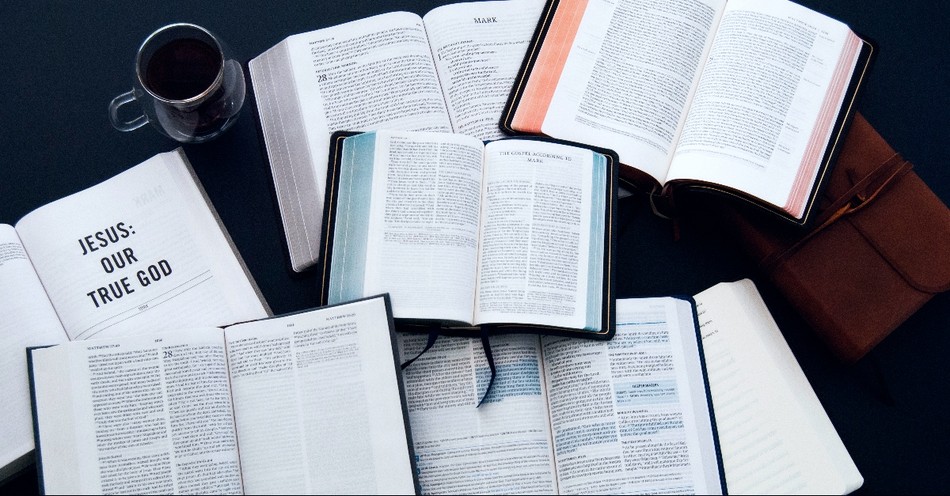I’ve only been on this spinning ball of dirt and salt-water for 22 years, but the people in my life all thought Study Bibles should be part of my existence. But in all that time, I never stopped to ask myself, what is a Study Bible?
The concept of a Study Bible is simple enough: It’s a Bible that comes with extra features like verse-by-verse breakdowns, discussion questions, extra-wide margins for note-taking, and other fun bells and whistles.
But what does a study Bible do? I’ve read several of them over the years and have come to the conclusion that, as different as they all are from each other, they do four main things: Make big ideas fit in your little brain, clarify difficult concepts, teach you how to get to know God, deepen your theological knowledge, and create space to meditate on the Word day and night.
1. Clarify Difficult Concepts
As soon as I was old enough to read on my own, Tita — the wonderful, yet terrifying Filipina lady who homeschooled me — sat me on her scratchy green couch, put the Precious Moments Study Bible in my hands, and told me to read at least one chapter every day.
When I eventually got bored of Precious Moments, Mom and Dad got me Psalty’s Kids Bible, which featured devotionals by Psalty, the hymnal, his parents, Grammar and Pop-Up, and a host of other “book-people” I grew to love and trust.
I don’t remember these Bibles because they are Bibles, I remember them because they told me stories. For example, in Precious Moments, a little girl grappled with the fact that her friend was an unbeliever. And in Psalty’s, Psalty told me that God loves me when bullies don’t.
Those little stories got stuck in my brain because the Bibles they came from accomplished what all good Study Bibles should: They make the Word of God more accessible.
2. Equip You to Build Your Own Relationship with God
When I got baptized at my childhood church, Pastor Grant gave me The Edge Devotional Bible. It sat dusty and unread on my shelf until sixth grade rolled around. Much like with Precious Moments and Psalty’s, I only read the “fun” parts: The prayers, the tips, and the devotionals written as if the Bible characters themselves were talking to me.
No specific prayer or discussion point or anything jumps out at me when I think of The Edge, but I do remember feeling like the Bible was still a bit much to take on and that I needed help to get through it.
The Edge gave me the help I needed. Without it, I wouldn’t have the tools to develop a faith that was mine, not my parents’.
3. Deepen Your Theological Knowledge
I started attending a different church than my parents when I was a senior in high school. Pastor Brad, after having only known me for two Sundays, found out that I was graduating soon and got me a present: a copy of The Reformation Study Bible with my name engraved in silver on the front.
I hardly touch that Bible now — thanks to college, I’m still recovering from textbook-induced trauma — but when I first got my hands on this Bible, I did something I hadn’t done much of before: I read the actual Bible part, not just the notes.
The Reformation was more textbook than devotional, but the more I read of the Word itself, the more fascinating R.C. Sproul’s dense descriptions of forgiveness, salvation, and Old Testament law became.
This Bible did what all Study Bibles should do, but very few do well: Teach you the concepts you need to figure out what the Bible is actually saying.
4. Giving You Room to Explore the Bible
Journal the Word, the last of my Study Bibles, was a gift from my roommate. Lyndsey had been planning to save it for when I graduated college, but she noticed I’d been more stressed and burnt-out than usual and gave it to me a semester early.
This is the Bible I use now because it’s simple: The bottom third of the page has footnotes defining tricky words and cross-referencing other verses, and the margins are extra-wide for writing notes.
Whenever I have trouble sleeping, I read Matthew, take notes, track down any referenced verses, and take notes on those, too. Jumping back and forth through the Bible at my own pace, combined with the freedom to go down rabbit trails whenever I want, is liberating for me and makes the Bible fun.
It must be strange to see "Bible" and "fun" in the same sentence, but here’s why I put them there: A good Study Bible shouldn’t force your brain into thinking one way or another. It should provide the opportunity to think critically and explore the relationship God wants to have with you.
Why Does This Matter?
Over 100,000 results come up when I type “Study Bible” into the search bar, but you can narrow that down for yourself by knowing what a good one looks like. But no matter what type works for you, remember this: The devotions, tips, and pre-written prayers are tools, not the Bible itself. Use them when you need to, then let the word of God do the rest.
©SparrowStock





.jpg)